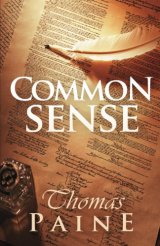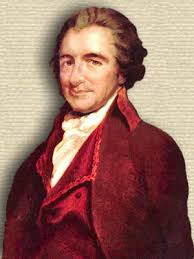Common Sense Page #14
Common Sense is a pamphlet written by Thomas Paine in 1775–1776 advocating independence from Great Britain to people in the Thirteen Colonies. Writing in clear and persuasive prose, Paine marshaled moral and political arguments to encourage common people in the Colonies to fight for egalitarian government.
First.--It is the custom of nations, when any two are at war, for some other powers, not engaged in the quarrel, to step in as mediators, and bring about the preliminaries of a peace: but while America calls herself the Subject of Great-Britain, no power, however well disposed she may be, can offer her mediation. Wherefore, in our present state we may quarrel on for ever. Secondly.--It is unreasonable to suppose, that France or Spain will give us any kind of assistance, if we mean only, to make use of that assistance for the purpose of repairing the breach, and strengthening the connection between Britain and America; because, those powers would be sufferers by the consequences. Thirdly.--While we profess ourselves the subjects of Britain, we must, in the eye of foreign nations, be considered as rebels. The precedent is somewhat dangerous to their peace, for men to be in arms under the name of subjects; we, on the spot, can solve the paradox: but to unite resistance and subjection, requires an idea much too refined for common understanding. Fourthly.--Were a manifesto to be published, and despatched to foreign courts, setting forth the miseries we have endured, and the peaceable methods we have ineffectually used for redress; declaring, at the same time, that not being able, any longer, to live happily or safely under the cruel disposition of the British court, we had been driven to the necessity of breaking off all connections with her; at the same time, assuring all such courts of our peaceable disposition towards them, and of our desire of entering into trade with them: Such a memorial would produce more good effects to this Continent, than if a ship were freighted with petitions to Britain. Under our present denomination of British subjects, we can neither be received nor heard abroad: The custom of all courts is against us, and will be so, until, by an independance, we take rank with other nations. These proceedings may at first appear strange and difficult; but, like all other steps which we have already passed over, will in a little time become familiar and agreeable; and, until an independance is declared, the Continent will feel itself like a man who continues putting off some unpleasant business from day to day, yet knows it must be done, hates to set about it, wishes it over, and is continually haunted with the thoughts of its necessity. APPENDIX. Since the publication of the first edition of this pamphlet, or rather, on the same day on which it came out, the King's Speech made its appearance in this city. Had the spirit of prophecy directed the birth of this production, it could not have brought it forth, at a more seasonable juncture, or a more necessary time. The bloody mindedness of the one, shew the necessity of pursuing the doctrine of the other. Men read by way of revenge. And the Speech, instead of terrifying, prepared a way for the manly principles of Independance. Ceremony, and even, silence, from whatever motive they may arise, have a hurtful tendency, when they give the least degree of countenance to base and wicked performances; wherefore, if this maxim be admitted, it naturally follows, that the King's Speech, as being a piece of finished villainy, deserved, and still deserves, a general execration both by the Congress and the people. Yet, as the domestic tranquillity of a nation, depends greatly, on the chastity of what may properly be called national manners, it is often better, to pass some things over in silent disdain, than to make use of such new methods of dislike, as might introduce the least innovation, on that guardian of our peace and safety. And, perhaps, it is chiefly owing to this prudent delicacy, that the King's Speech, hath not, before now, suffered a public execution. The Speech if it may be called one, is nothing better than a wilful audacious libel against the truth, the common good, and the existence of mankind; and is a formal and pompous method of offering up human sacrifices to the pride of tyrants. But this general massacre of mankind, is one of the privileges, and the certain consequence of Kings; for as nature knows them not, they know not her, and although they are beings of our own creating, they know not us, and are become the gods of their creators. The Speech hath one good quality, which is, that it is not calculated to deceive, neither can we, even if we would, be deceived by it. Brutality and tyranny appear on the face of it. It leaves us at no loss: And every line convinces, even in the moment of reading, that He, who hunts the woods for prey, the naked and untutored Indian, is less a Savage than the King of Britain. Sir John Dalrymple, the putative father of a whining jesuitical piece, fallaciously called, "The Address of the people of England to the inhabitants of America," hath, perhaps, from a vain supposition, that the people here were to be frightened at the pomp and description of a king, given, (though very unwisely on his part) the real character of the present one: "But" says this writer, "if you are inclined to pay compliments to an administration, which we do not complain of," (meaning the Marquis of Rockingham's at the repeal of the Stamp Act) "it is very unfair in you to withhold them from that prince, by whose nod alone they were permitted to do any thing." This is toryism with a witness! Here is idolatry even without a mask: And he who can calmly hear, and digest such doctrine, hath forfeited his claim to rationality--an apostate from the order of manhood; and ought to be considered--as one, who hath not only given up the proper dignity of man, but sunk himself beneath the rank of animals, and contemptibly crawls through the world like a worm. However, it matters very little now, what the king of England either says or does; he hath wickedly broken through every moral and human obligation, trampled nature and conscience beneath his feet; and by a steady and constitutional spirit of insolence and cruelty, procured for himself an universal hatred. It is now the interest of America to provide for herself. She hath already a large and young family, whom it is more her duty to take care of, than to be granting away her property, to support a power who is become a reproach to the names of men and christians--Ye, whose office it is to watch over the morals of a nation, of whatsoever sect or denomination ye are of, as well as ye, who are more immediately the guardians of the public liberty, if ye wish to preserve your native country uncontaminated by European corruption, ye must in secret wish a separation--But leaving the moral part to private reflection, I shall chiefly confine my farther remarks to the following heads. First. That it is the interest of America to be separated from Britain. Secondly. Which is the easiest and most practicable plan, reconciliation or independance? with some occasional remarks. In support of the first, I could, if I judged it proper, produce the opinion of some of the ablest and most experienced men on this continent; and whose sentiments, on that head, are not yet publicly known. It is in reality a self-evident position: For no nation in a state of foreign dependance, limited in its commerce, and cramped and fettered in its legislative powers, can ever arrive at any material eminence. America doth not yet know what opulence is; and although the progress which she hath made stands unparalleled in the history of other nations, it is but childhood, compared with what she would be capable of arriving at, had she, as she ought to have, the legislative powers in her own hands. England is, at this time, proudly coveting what would do her no good, were she to accomplish it; and the Continent hesitating on a matter, which will be her final ruin if neglected. It is the commerce and not the conquest of America, by which England is to be benefited, and that would in a great measure continue, were the countries as independant of each other as France and Spain; because in many articles, neither can go to a better market. But it is the independance of this country of Britain or any other, which is now the main and only object worthy of contention, and which, like all other truths discovered by necessity, will appear clearer and stronger every day.
Translation
Translate and read this book in other languages:
Select another language:
- - Select -
- 简体中文 (Chinese - Simplified)
- 繁體中文 (Chinese - Traditional)
- Español (Spanish)
- Esperanto (Esperanto)
- 日本語 (Japanese)
- Português (Portuguese)
- Deutsch (German)
- العربية (Arabic)
- Français (French)
- Русский (Russian)
- ಕನ್ನಡ (Kannada)
- 한국어 (Korean)
- עברית (Hebrew)
- Gaeilge (Irish)
- Українська (Ukrainian)
- اردو (Urdu)
- Magyar (Hungarian)
- मानक हिन्दी (Hindi)
- Indonesia (Indonesian)
- Italiano (Italian)
- தமிழ் (Tamil)
- Türkçe (Turkish)
- తెలుగు (Telugu)
- ภาษาไทย (Thai)
- Tiếng Việt (Vietnamese)
- Čeština (Czech)
- Polski (Polish)
- Bahasa Indonesia (Indonesian)
- Românește (Romanian)
- Nederlands (Dutch)
- Ελληνικά (Greek)
- Latinum (Latin)
- Svenska (Swedish)
- Dansk (Danish)
- Suomi (Finnish)
- فارسی (Persian)
- ייִדיש (Yiddish)
- հայերեն (Armenian)
- Norsk (Norwegian)
- English (English)
Citation
Use the citation below to add this book to your bibliography:
Style:MLAChicagoAPA
"Common Sense Books." Literature.com. STANDS4 LLC, 2024. Web. 25 Nov. 2024. <https://www.literature.com/book/common_sense_270>.




Discuss this Common Sense book with the community:
Report Comment
We're doing our best to make sure our content is useful, accurate and safe.
If by any chance you spot an inappropriate comment while navigating through our website please use this form to let us know, and we'll take care of it shortly.
Attachment
You need to be logged in to favorite.
Log In